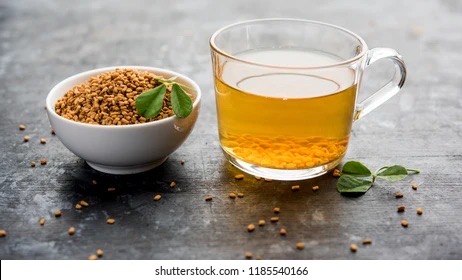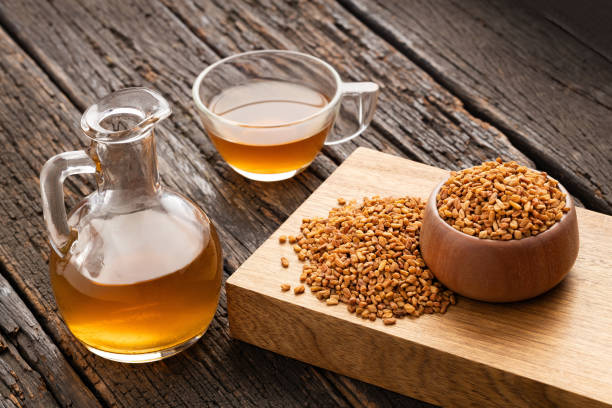"The Health Benefits of Fenugreek"
- Cami Onolfo

- Apr 13, 2024
- 4 min read
Updated: Apr 17, 2024
Growing up in the Carpathian mountains, I was exposed to herbal remedies since early childhood.
Unlocking the power of Holistic Healing: Discover the "Health Benefits of Fenugreek"
Are you ready to embark on a toward holistic wellness and vitality? At Miracle Herbal Clinics, we believe in harnessing the natural healing properties of herbs and energy to promote balance and harmony in mind, body, and spirit. Today, we delve into the incredible health benefits of fenugreek and how it can enhance your holistic healing experience.
The Fenugreek Miracle: A Holistic Perspective
Fenugreek, a versatile herb with a rich history in traditional medicine, offers a plethora of health benefits that align perfectly with our holistic approach to wellness. From boosting energy levels to supporting digestion and promoting overall vitality, fenugreek holds the key to unlocking your body's natural healing potential.
Ever since I was a child, I used herbs to treat myself of different ailments and I have always been fascinated by their health benefits and uses. My curiosity took me farther and I wanted to learn of how these fascinating plants are used in other continents and in other forms of medicine. Today I want to talk about Fenugreek, a plant who many may not know, and want to share just a few health benefits of this healing plant and it's amazing properties.
Origin
Fenugreek is native of Southern Europe and West Asia.
Fenugreek , Nutritional value
The Fenugreek seeds contain a variety of vitamins and minerals such as Vitamin C, potassium, magnesium, vitamin B6, Vitamin D, calcium, iron vitamin A, and cobalamin.
1tbsp (11.1 g), contains 36 calories, 2.6 g of protein and 2.7 g of dietary fiber.
The amino acid 4-hydroxyisoleucine contained in the seeds, stimulates insulin secretion.
Fenugreek also contain a substance called diogenin, similar to estrogen
Energize Your Body, Revitalize Your Spirit
Imagine waking up each day feeling invigorated and ready to conquer the world. With our energy healing, you can experience a profound sense of renewal and vitality that from within. Whether you're seeking relief from stress, chronic pain, or simply yearning for a deeper connection to your inner self, our experienced practitioners are here to guide you on your healing journey.
Medicinal Uses:
Fenugreek has anti-fungal, anti-inflammatory, and antioxidant properties. Also acts as a laxative, lubricates the intestines, and reduces fever.
The Fenugreek seeds are used to treat digestive problems, loss of appetite, upset stomach, and constipation. Fenugreek is also known to strengthen the arteries, helps regulating high blood pressure, cholesterols and triglycerides. It is also known to treat kidney ailments, beriberi, mouth ulcers, bronchitis, tuberculosis, chronic cough, baldness, and cellulite.
TCM
In The Chinese traditional healing, the seeds are used to treat kidney disorders, edema, liver ailments, impotence, loss of libido, menstrual cramps, premature ejaculation, erectile dysfunction, testicular pain and hernia.
In Ayurvedic Medicine, Fenugreek is used as an aphrodisiac for rejuvenation and as a diuretic, as well as for dyspepsia, cough, colic, bronchitis, constipation, gout, and arthritis. It is also used to reduce liver and spleen enlargement, and as a breast enhancer.
Holistic Consultations: Your Path to Wellness
Ready to take charge of your health and well-being? Our holistic consultations provide personalized guidance and support tailored to your unique needs and goals. From recommendations to stress techniques, we'll empower you with the knowledge and tools necessary to thrive in all aspects of your life.
Transform Your Health, Transform Your Life
But don't just take our word for it, hear from our satisfied clients who have experienced the transformative power of holistic healing firsthand. From increased energy and vitality to a renewed sense of purpose and joy, our clients rave about the life-changing benefits of our services.
How to Use Fenugreek:
The seeds are used in form of tea as a laxative, liver detoxifier, and to relieve cough and bronchitis. A poultice made of Fenugreek can be applied directly on the skin to treat swelling of the muscle, local pain, swelling of the lymph nodes, gout, leg ulcers and eczema. The Diogenin found in the seeds is used to increase libido, and male potency and reduces hot flashes, and mood fluctuations caused by PMS and symptoms of menopause.
Home made remedy from Fenugreek
How to make: Add 1tsp of roasted Fenugreek seeds to 1 cup of boiling water. Steep for 15 min and drink 2-3 cup per day.
A hair mask made from Fenugreek seeds powder is used to prevent hair loss and it also gives a glow to the hair.
Join the Holistic Healing Revolution
Are you ready to embrace the holistic healing revolution and embark on a journey towards optimal health and well-being? Contact us today to learn more about our energy healing sessions and holistic consultations. Together, we'll unlock the full potential of your mind, body, and spirit and help you live your best life possible.
Your Journey Starts Here
At Miracle Herbal Clinics, we're dedicated to helping you achieve your health and wellness goals through the power of holistic healing. Join us on this transformative journey and experience the miracle of fenugreek and the profound benefits of holistic wellness. Your journey to radiant health begins today.
For more information and bookings go to www.miracleherbalclinics.com
Enjoy!
Your Holistic Nutritionist and Energy Healer
Cami Onolfo ❤️









Comments